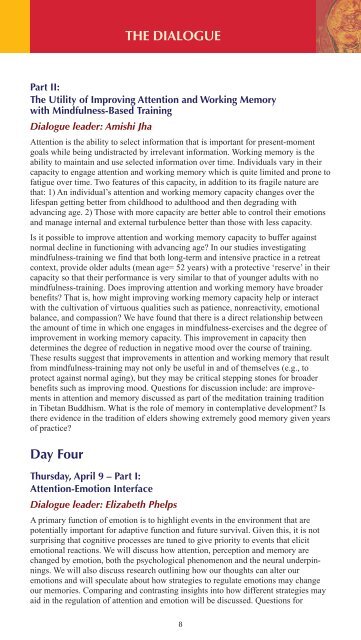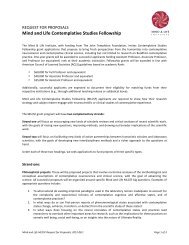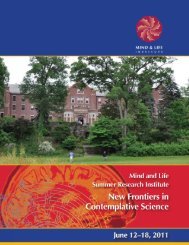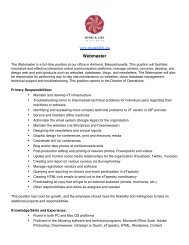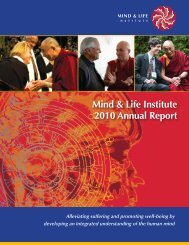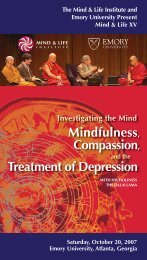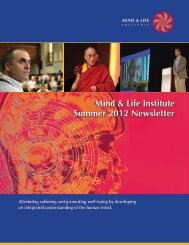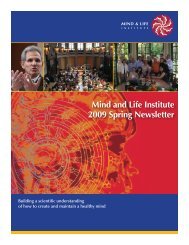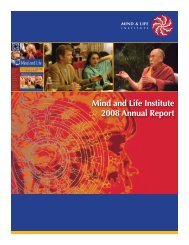to view the brochure from the conference (PDF). - Mind & Life Institute
to view the brochure from the conference (PDF). - Mind & Life Institute
to view the brochure from the conference (PDF). - Mind & Life Institute
Create successful ePaper yourself
Turn your PDF publications into a flip-book with our unique Google optimized e-Paper software.
SPEAKER and PANELIST<br />
THEBIOGRAPHIES<br />
DIALOGUE<br />
Part II:<br />
The Utility of Improving Attention and Working Memory<br />
with <strong>Mind</strong>fulness-Based Training<br />
Dialogue leader: Amishi Jha<br />
Attention is <strong>the</strong> ability <strong>to</strong> select information that is important for present-moment<br />
goals while being undistracted by irrelevant information. Working memory is <strong>the</strong><br />
ability <strong>to</strong> maintain and use selected information over time. Individuals vary in <strong>the</strong>ir<br />
capacity <strong>to</strong> engage attention and working memory which is quite limited and prone <strong>to</strong><br />
fatigue over time. Two features of this capacity, in addition <strong>to</strong> its fragile nature are<br />
that: 1) An individual’s attention and working memory capacity changes over <strong>the</strong><br />
lifespan getting better <strong>from</strong> childhood <strong>to</strong> adulthood and <strong>the</strong>n degrading with<br />
advancing age. 2) Those with more capacity are better able <strong>to</strong> control <strong>the</strong>ir emotions<br />
and manage internal and external turbulence better than those with less capacity.<br />
Is it possible <strong>to</strong> improve attention and working memory capacity <strong>to</strong> buffer against<br />
normal decline in functioning with advancing age In our studies investigating<br />
mindfulness-training we find that both long-term and intensive practice in a retreat<br />
context, provide older adults (mean age= 52 years) with a protective ‘reserve’ in <strong>the</strong>ir<br />
capacity so that <strong>the</strong>ir performance is very similar <strong>to</strong> that of younger adults with no<br />
mindfulness-training. Does improving attention and working memory have broader<br />
benefits That is, how might improving working memory capacity help or interact<br />
with <strong>the</strong> cultivation of virtuous qualities such as patience, nonreactivity, emotional<br />
balance, and compassion We have found that <strong>the</strong>re is a direct relationship between<br />
<strong>the</strong> amount of time in which one engages in mindfulness-exercises and <strong>the</strong> degree of<br />
improvement in working memory capacity. This improvement in capacity <strong>the</strong>n<br />
determines <strong>the</strong> degree of reduction in negative mood over <strong>the</strong> course of training.<br />
These results suggest that improvements in attention and working memory that result<br />
<strong>from</strong> mindfulness-training may not only be useful in and of <strong>the</strong>mselves (e.g., <strong>to</strong><br />
protect against normal aging), but <strong>the</strong>y may be critical stepping s<strong>to</strong>nes for broader<br />
benefits such as improving mood. Questions for discussion include: are improvements<br />
in attention and memory discussed as part of <strong>the</strong> meditation training tradition<br />
in Tibetan Buddhism. What is <strong>the</strong> role of memory in contemplative development Is<br />
<strong>the</strong>re evidence in <strong>the</strong> tradition of elders showing extremely good memory given years<br />
of practice<br />
Day Four<br />
Thursday, April 9 – Part I:<br />
Attention-Emotion Interface<br />
Dialogue leader: Elizabeth Phelps<br />
A primary function of emotion is <strong>to</strong> highlight events in <strong>the</strong> environment that are<br />
potentially important for adaptive function and future survival. Given this, it is not<br />
surprising that cognitive processes are tuned <strong>to</strong> give priority <strong>to</strong> events that elicit<br />
emotional reactions. We will discuss how attention, perception and memory are<br />
changed by emotion, both <strong>the</strong> psychological phenomenon and <strong>the</strong> neural underpinnings.<br />
We will also discuss research outlining how our thoughts can alter our<br />
emotions and will speculate about how strategies <strong>to</strong> regulate emotions may change<br />
our memories. Comparing and contrasting insights in<strong>to</strong> how different strategies may<br />
aid in <strong>the</strong> regulation of attention and emotion will be discussed. Questions for<br />
8


